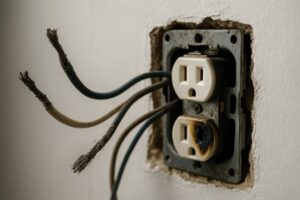Electrical wiring is an essential component of modern homes and buildings, powering everything from lights to appliances and everything in between. Yet, it often remains out of sight, hidden behind walls and ceilings, which can make its maintenance and condition easy to overlook. Faulty electrical wiring can lead to severe dangers that may not be immediately apparent. Understanding these risks is crucial for homeowners and businesses alike to ensure safety and prevent costly damage.

1. Fire Hazard
One of the most dangerous consequences of faulty electrical wiring is the risk of fire. According to the National Fire Protection Association (NFPA), electrical failures or malfunctions are the leading causes of home fires. When wires become frayed, overloaded, or improperly installed, they can heat up and potentially ignite surrounding materials, such as insulation, wood, or fabrics.
For example, old and damaged wires may have exposed metal, which can cause a short circuit when it touches another wire or conductive material. The resulting spark can be enough to start a fire. Faulty wiring is also common in outdated homes where wiring was installed decades ago without modern safety codes or equipment, such as circuit breakers that could stop the current in the event of a short circuit.
2. Electrocution Risk
Faulty wiring can pose a significant electrocution risk, especially in areas where people might come into contact with exposed wires or damaged outlets. For instance, a broken or improperly installed outlet can lead to electric shocks when touched. Children, in particular, are vulnerable to this danger, which is why tamper-resistant outlets and proper electrical maintenance are essential in any home.
Furthermore, poor wiring can cause grounding issues, where electrical current flows through unintended paths like metal pipes, increasing the risk of electrocution. An improperly grounded system can be especially dangerous for anyone working with electrical appliances or machinery.
3. Power Surges and Equipment Damage
Faulty wiring not only jeopardizes safety but can also wreak havoc on your electronic devices and appliances. When there’s a surge in electrical power due to overloaded circuits or wiring issues, it can send sudden spikes of electricity that damage sensitive components in devices such as computers, refrigerators, and televisions. This can lead to immediate breakdowns, leaving you with the need for appliance repair in Ogden or even costly replacements.
While many electronics are equipped with built-in surge protection, it may not be enough to safeguard them from the damage caused by faulty wiring. Over time, repeated power surges can reduce the lifespan of appliances, resulting in more frequent repairs and higher replacement costs.
4. High Electricity Bills
Faulty wiring can also be an unexpected culprit behind skyrocketing electricity bills. If the electrical system is not functioning properly, appliances and devices may not be operating as efficiently as they should be. For instance, a circuit that is consistently overloaded or wiring that is poorly connected can cause appliances to work harder, consuming more electricity than necessary.
In some cases, damaged wiring can cause “phantom loads,” where electricity is being consumed by devices that are turned off. This hidden energy usage can add up over time, resulting in higher than expected electricity bills. Identifying and repairing faulty wiring is essential not only for safety but also for maintaining a reasonable energy cost.
5. Loss of Power
Another issue that arises from faulty wiring is the loss of power. If the wiring in your home or business is compromised, certain rooms or entire sections may experience frequent power outages. Overloaded circuits or faulty breakers may trip unexpectedly, causing inconvenient blackouts. In extreme cases, poor wiring can cause entire electrical systems to fail, resulting in a costly repair process.
Even when power isn’t completely lost, faulty wiring can lead to flickering lights, frequent tripping of circuit breakers, or devices that don’t function as they should. This can disrupt daily life and may cause unnecessary wear and tear on appliances.
6. Long-Term Structural Damage
While the immediate threats of electrical fires and electrocution are more obvious, faulty wiring can also cause long-term damage to your home. Electrical issues that go unnoticed can degrade the structural integrity of your home over time. For example, overheating wires may damage wood, drywall, and other materials, leading to rotting or weakening of structural elements.
Additionally, faulty wiring can sometimes cause moisture buildup in the walls, especially if insulation is affected. This can lead to mold growth, which can be both a health risk and a significant property damage issue.
7. How to Identify Faulty Wiring
Recognizing the signs of faulty wiring early can prevent many of the dangers outlined above. Common signs include:
- Flickering or dimming lights: If your lights flicker or dim when appliances are turned on, it could indicate an overloaded circuit or faulty wiring.
- Warm or hot outlets: Outlets or switches that feel warm to the touch can be a sign of overheating, which could be caused by wiring issues.
- Strange smells or buzzing noises: A burning smell or buzzing sounds coming from electrical outlets or appliances should never be ignored, as these could indicate electrical problems that need immediate attention.
- Tripped circuit breakers: Frequent tripping of circuit breakers could mean that your wiring is not able to handle the electrical load, putting your home at risk.
In Conclusion
The hidden dangers of faulty electrical wiring are far-reaching and can pose serious risks to both your safety and your property. From fires and electrocution to power surges and costly repairs, faulty wiring is not something to take lightly. Regular inspections by a licensed electrician, especially in older homes, are essential for preventing these risks and ensuring the safety of your home or business.
Taking proactive steps to maintain your electrical system is the best way to avoid these hidden dangers, protecting your family, property, and wallet in the long run.





